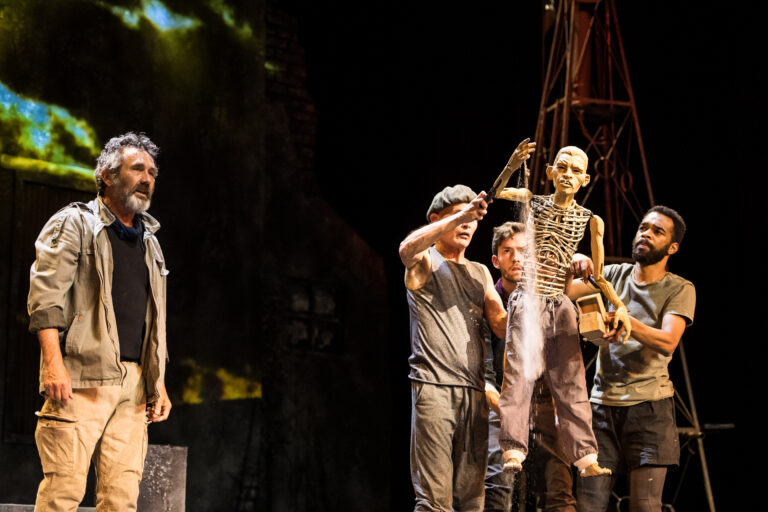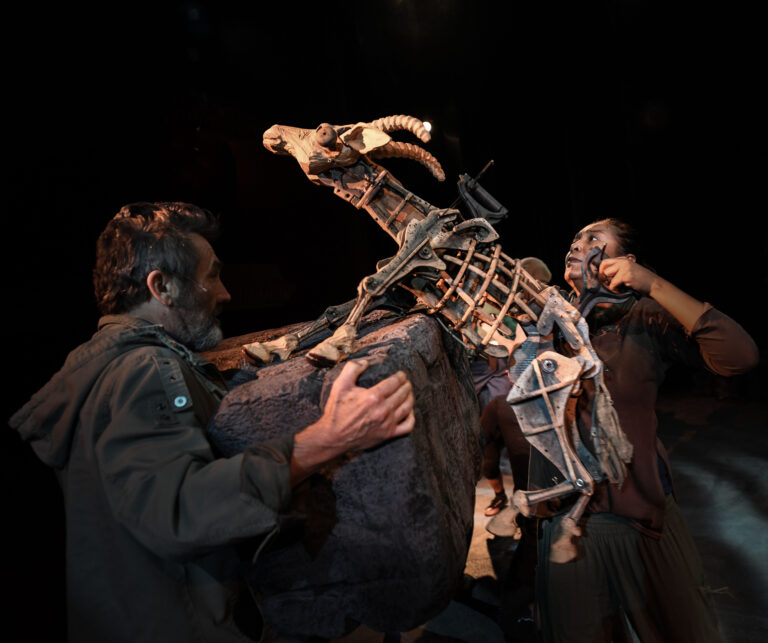
‘Life & Times of Michael K’ — Adapted and Directed by Lara Foot in collaboration with Handspring Puppet Company. Based on the book written by J.M Coetzee. Adaptors and Puppetry Direction by Basil J.R. Jones and Adrian P. Kohler. Puppetry Design by Adrian P. Kohler. A Baxter Theatre Centre and Düsseldorf Schauspielhaus Production. Presented by ArtsEmerson at the Emerson Paramount Center, Robert J. Orchard Stage, 559 Washington St., through February 9.
By Shelley A. Sackett
In substance, Life and Times of Michael K tells the extraordinary story of an ordinary man. Adapted from the 1983 Booker Prize winner, written by South African novelist J. M. Coetzee, it details the life of the eponymous Michael K and his ailing mother during a fictional civil war in South Africa.
As adapted and directed by Lara Foot in collaboration with the Tony award-winning Handspring Puppet Company, this simple tale becomes the captivating and transportive production presented by ArtsEmerson through February 9. “Must see” hardly does it justice; this is a groundbreaking pilgrimage into the multisensorial world of out-of-the-box theater.
Michael K was born with a severe cleft palate in besieged Cape Town, South Africa. Shunned his entire life, he is nonetheless resilient and good-natured. Devoted to his mother, Anna, he embarks on a journey to take her away from the destructive conflict and back to rural Prince Albert, her birthplace.

In this uninterrupted two-hour piece, Michael K. also happens to be a three-foot-tall puppet made of wood, cane, and carbon. Yet, miraculously, he is also the embodiment of grace, emotion and human interiority. He is maneuvered by three puppeteers (Craig Leo, Carlo Daniels, and Markus Schabbing) whose precision and synchronicity are impeccable and whose presence is both noticeable and integral to the play.
Life and Times of Michael K doesn’t play smoke and mirror games, camouflaging the puppeteers in black and trying to create the illusion that the puppets somehow function independently. Rather, it spotlights and celebrates the collaboration between human and puppet. Even when there are six people manipulating two puppets, the puppets are the undisputed focus and the magic spell is unbroken.
It’s hard to describe the enchantment of such artistry and skill.
The play opens with soft piano music as a performer carries an orange-shrouded Michael K. onto the stage. The shroud is lifted and a real, yet nonhuman, face is bared. With the slightest turn of the neck or tilt of the chin, that face expresses calm, pain and tears. One side emphasizes his cleft palate; the other his otherwise handsome features.
Yoav Dagan and Kirsti Cumming’s projection designs magnify Michael K.’s face, allowing the audience easier avenues of interior access and empathy. Green screen projections, a closed caption LED board and the use of rotating narrators add a multi-media excitement and emotional accessibility to the production. These elements don’t compete for our attention; rather, they complement and complete the action, conjuring something intoxicating and original.
Although there are nine people on stage — including the three puppeteers who manipulate Michael K — they are neither intrusive nor distracting. Michael K and the other five puppets (his mother, Anna, a feisty goat, and three curious children) seamlessly interact and interplay with the human beside them. They are different, but they are equals. At one point, Michael even addresses his handlers, offering them each a bite of his chicken pie even though he’s nearly dead from starvation.
The storyline is straightforward and told in linear chronology. We witness Michael’s birth (puppet Anna and her three puppeteers are amazing), his mother Anna’s rejection, and his childhood spent in institutions, where he learns gardening. When his mother falls ill and needs his help, she has him released and returned to her care. He now works as a gardener in Cape Town and tends Anna, a domestic servant to a wealthy family. The country descends into civil war and martial law is imposed. When Michael’s mother becomes very sick, he decides to quit his job and escape the city to return his mother to her birthplace, Prince Albert.

First, he jerry-rigs a wheelbarrow cart to transport his mother and their belongings. The two set off on a near-impossible trek that their banter and affection transforms into an adventure. Prone to philosophical questions and self-reflection, Michael K. frequently wonders why he had been brought into this world. His answer: to look after his mother. He never gives a second thought to the fact that his mother never looked after him.
That reason changes when his mother dies in a heartbreaking scene sensitively lit (Joshua Cutts) and soundtracked (Simon Kohler). His life takes a series of twists and turns when he encounters friends, enemies, detours, dangers, passions, hope — and one very spirited goat.
Yet, his innate ability to transcend and find the miracle in everyday life saves him from gloom and despair. He is relentlessly forgiving and accepting, unearthing solace in his life as a cultivator and eventual return to the farm where his mother was born. At last, he can let her ashes go. She is home and, he realizes, so is he.

Enhancing the script and dazzling puppetry are Patrick Curtis’ set design and Dagan and Cummings’ projection design. Curtis uses minimum props and a smoky palette to maximum effect, creating a set versatile enough to serve as delivery room, bus, school, waves, farm and work camp. Backdrop projections ensure the audience is in lockstep with Michael K and his journey with inspired and enhancing visuals.
While Life and Times of Michael K is adapted from a work of fiction written over 40 years ago, its themes of displacement, poverty, discrimination and civil unrest are still relevant and perhaps even more urgently felt today. Yet Michael K’s journey focuses more on the internal than external as he uncovers his personal philosophy of life. “A man must live so that he leaves no trace of his living,” he says, vowing to only eat food he has grown himself. “There is no shame in being simple. One spoonful of water is enough to live,” he adds.
Michael K may be a puppet, but he has more heart and soul than many people.For more information and to buy tickets, visit www.artemerson.org

